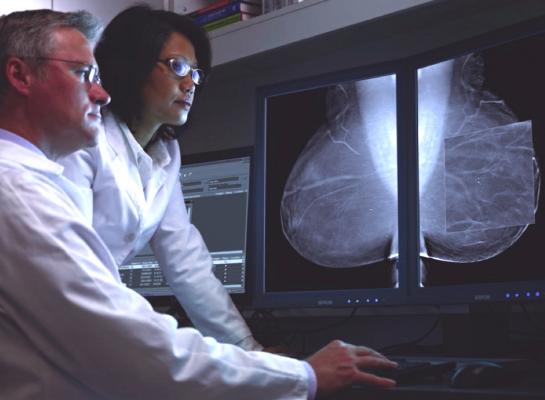
October 16, 2017 — The Tomosynthesis Mammographic Imaging Screening Trial (TMIST), the first randomized trial to compare two types of digital mammography for breast cancer screening, is now open for enrollment. The study was developed by the ECOG-ACRIN Cancer Research Group (ECOG-ACRIN) and the National Cancer Institute (NCI), part of the National Institutes of Health. ECOG-ACRIN is leading the trial.
TMIST researchers are enrolling healthy women ages 45 to 74 who are already planning to get routine mammograms. By taking part in TMIST, the 165,000 planned participants will provide critical information that will help researchers learn how to most effectively screen women for breast cancer and help women make informed decisions about the screening tests in the future.
“Nearly 50 million screening mammograms occur each year in the United States, yet it has been decades since a large-scale randomized trial of mammography has been done,” said Worta McCaskill-Stevens, M.D., director of the NCI Community Oncology Research Program (NCORP), the NCI program supporting the trial. “The evolution of mammography technology provides us with an opportunity to fill in the gaps in our knowledge about two available breast cancer screening tests.”
TMIST is comparing two types of digital mammography approved by the U.S. Food and Drug Administration (FDA) : tomosynthesis (known as three-dimensional, or 3-D) and conventional (two-dimensional, or 2-D). Although 3-D mammography, being the newer technology, is likely to detect more findings that require follow-up, it is also likely to lead to more procedures and treatments. It is not known if this newer mammography technology is reducing a woman’s risk of developing a life-threatening (advanced) cancer compared with 2-D mammography. The TMIST trial aims to find out.
“We need to determine if 3-D mammography is better than 2-D at finding the sort of breast cancers that are most likely to spread and kill women,” said ECOG-ACRIN study chair Etta D. Pisano, M.D., vice chair of research in the Department of Radiology at Beth Israel Deaconess Medical Center and professor in residence of radiology at Harvard Medical School, Boston. “If a newer screening technology does not reduce the numbers of advanced, life-threatening cancers, then are we really improving screening for breast cancer?”
TMIST researchers are collecting data on the results of every mammogram, whether the breast imaging shows no signs of cancer, findings suspicious of cancer, or a breast cancer. Any medical follow-ups, such as more imaging or biopsies, are also being reported. TMIST researchers intend to follow all participants for breast cancer status, treatment and outcomes from the time of randomization until the end of the clinical study (at least 2025).
Based on the findings of earlier studies, researchers know that the vast majority of women in the study will not develop breast cancer. If a woman does receive a diagnosis of any kind of breast cancer while in the trial, she will receive treatment just as she would if she was not part of TMIST, while continuing to be part of the trial.
In addition to data from mammograms, the trial is building a biorepository for future research on genetic markers for breast cancer by asking all participants to voluntarily submit blood samples and swabs of cells from inside the mouth (buccal cells). This data could, in the future, help women and their doctors decide the best ways to screen for breast cancer by evaluating their individual risk factors for developing the disease. TMIST researchers are also analyzing tissue collected from women who have biopsies during the trial because of mammogram findings that require follow-up. This is to learn more about the biology of breast cancers detected through screening.
About 100 mammography clinics in the United States are planning to participate in the trial and are opening on a rolling basis over the next several months. Women are being told about the opportunity to enroll in the trial when they schedule a routine mammogram. Once enrolled, they will be assigned to either 2-D or 3-D mammography screening. Most women enrolled in the trial will be screened annually. Postmenopausal women with no high-risk factors will be screened every two years.
To ensure a diverse group of participants, sites are well represented both geographically and by the race/ethnicity of the women the sites serve. Several Canadian clinics are joining the trial, having already enrolled more than 3,000 women in a smaller lead-in study that is helping to inform TMIST.
For more information: www.ecog-acrin.org


 February 18, 2026
February 18, 2026 









